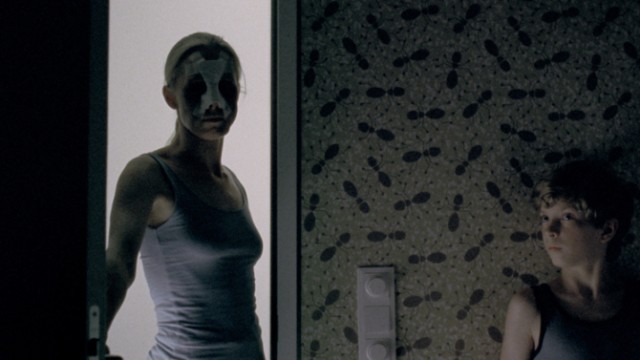All around us, women are tied to their looks. Women are told, through direct and indirect methods, that their only value is in their visual worth. If you’re not pretty, you’re nothing. What are you if not your face? These societal messages come from the media, family, strangers, even, at times, your friends. How a person looks is important to how they are received. Recently, this message has been attached to men and men’s looks, but for nowhere near as long nor as deep as the message has been ingrained into women.
This goes double if you have a life in the public arena. Female celebrities are judged on their looks constantly. Don’t get plastic surgery, and you could be called an old crone; get plastic surgery and you run the risk of being called fake or worse. There is so much pressure to maintain your youth that sometimes there is no choice but going under the knife.
Goodnight Mommy opens with a mother returning home from some sort of facial surgery. Her whole face is covered with gauze and kept constantly wrapped. She is some sort of media figure – model, news anchor, etc – who keeps her house filled with images recalling a woman’s destroyed identity. In her bedroom, she keeps a headless mesh dress form. Images of women hanging on the wall have blurred faces. Women have lost their identity in society; the body is public but the face is personal.
The woman returns home to her identical twin sons who enjoy collecting bugs, traipsing around the woods, and getting up to mischief. But, the atmosphere is as cold as the decorations. Something is wrong, and it isn’t necessarily just the mother. She’s reacts edgily to her sons, who are attempting to deal with their mother’s curtness as they can. Their mother is constantly wrapped in gauze, and not acting like herself. They decide that the woman isn’t their mother and engage in emotional and physical warfare.
Written and directed by Veronika Franz and Severin Fiala, and produced by Franz’s husband, Ulrich Siedl, Goodnight Mommy plays with the intersection of female identity as well as trust and family issues. Beginning with an ice cold atmosphere straight out of the Haneke playbook, Mommy eventually leads into a ghoulish nightmare resembling the New French Extremity horror genre. People with weak stomachs need not apply; this camera doesn’t blink.
Before they even get into the harsher elements of horror that will leave you feeling dirty, Franz and Fiala have made an icy cold atmosphere that constantly tightens the noose, feeling ever more claustrophobic. Deepening the movie to another level, Franz and Fiala want the audience to identify with the twin sons, but you’re never quite sure if you’re also identifying with the mother. Constantly on edge about who the real villains are, even through the final moments, Goodnight Mommy plays the audience against itself providing just enough details to draw the frame without the giving away the spoils.
Tense, frightening, cold, extreme, Goodnight Mommy will disturb the hell out of you. The societal issues that fill the edges are just extra pieces of brainfood to gnaw on while hitting the panic button. Goodnight Mommy makes The Babadook look like child’s play. And it’s a hell of a lot of fun.

